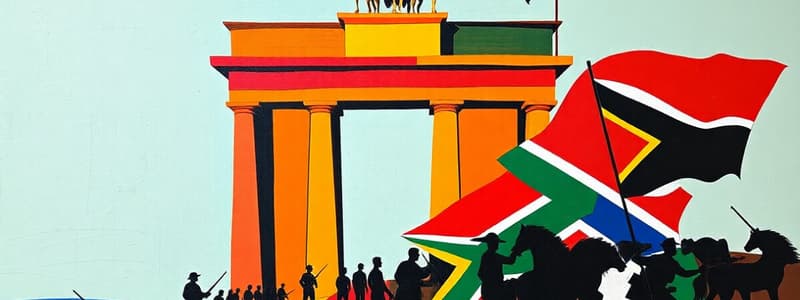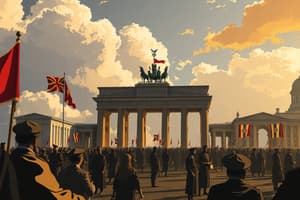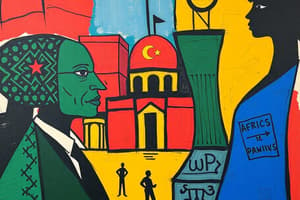Podcast
Questions and Answers
What was the main purpose of the Berlin Conference?
What was the main purpose of the Berlin Conference?
- To protect the rights of indigenous African peoples.
- To create a united African government.
- To establish clear guidelines for the colonization of Africa. (correct)
- To promote trade with African nations.
What was a significant consequence of the colonial borders established at the Berlin Conference?
What was a significant consequence of the colonial borders established at the Berlin Conference?
- Greater stability and peace within African societies.
- The creation of a unified African identity.
- The suppression of traditional African culture and practices. (correct)
- Increased economic prosperity within African colonies.
What was the main cause of the Boer Wars?
What was the main cause of the Boer Wars?
- The discovery of diamonds and gold in the Transvaal region.
- The desire of the Dutch Afrikaners to establish an independent state.
- Competition for resources and land between the British and the Dutch Afrikaners. (correct)
- The British attempt to abolish slavery in the Cape Colony.
Which of the following statements BEST describes the impact of King Leopold II's rule over the Belgian Congo?
Which of the following statements BEST describes the impact of King Leopold II's rule over the Belgian Congo?
Which of the following African nations was successful in resisting European colonization during the 19th century?
Which of the following African nations was successful in resisting European colonization during the 19th century?
Flashcards
Berlin Conference
Berlin Conference
A meeting in 1884-1885 to regulate colonization and trade in Africa without African representation.
Boer Wars
Boer Wars
Conflicts from 1880-1902 between British forces and Dutch Afrikaners over territory in South Africa.
King Leopold II
King Leopold II
The Belgian king who exploited the Congo for profit through brutal labor practices until 1908.
Impact of Colonial Borders
Impact of Colonial Borders
Signup and view all the flashcards
Ethiopian Resistance
Ethiopian Resistance
Signup and view all the flashcards
Study Notes
The Berlin Conference (1884-1885)
- Bismarck convened the Berlin Conference to determine how to colonize Africa without triggering conflict.
- No Africans were invited.
- Colonial boundaries were agreed upon, facilitating goods movement on major rivers.
- The defined borders disregarded existing social structures and forced rival groups into a single colony, setting the stage for future warfare.
Conflicts and Consequences of Colonization
- The British settled in the Cape Colony, leading to clashes with the Dutch Afrikaners.
- The Boer Wars (1880-1881 and 1899-1902) pitted the British against the Dutch Afrikaners.
- British forces relocated Afrikaners and Africans to refugee camps, causing widespread starvation.
- Displaced populations were often assigned poor land unsuitable for agriculture.
Belgian Congo and Leopold II's Rule
- King Leopold II privately controlled the Belgian Congo and profited immensely from brutally exploiting local labor.
- Conditions improved only after Belgium took direct control of the colony in 1908.
Independent African Nations
- Liberia and Abyssinia (Ethiopia) remained independent.
- Liberia was populated by former slaves and relied on US support.
- Ethiopian forces effectively repelled an Italian invasion in 1895.
Studying That Suits You
Use AI to generate personalized quizzes and flashcards to suit your learning preferences.




